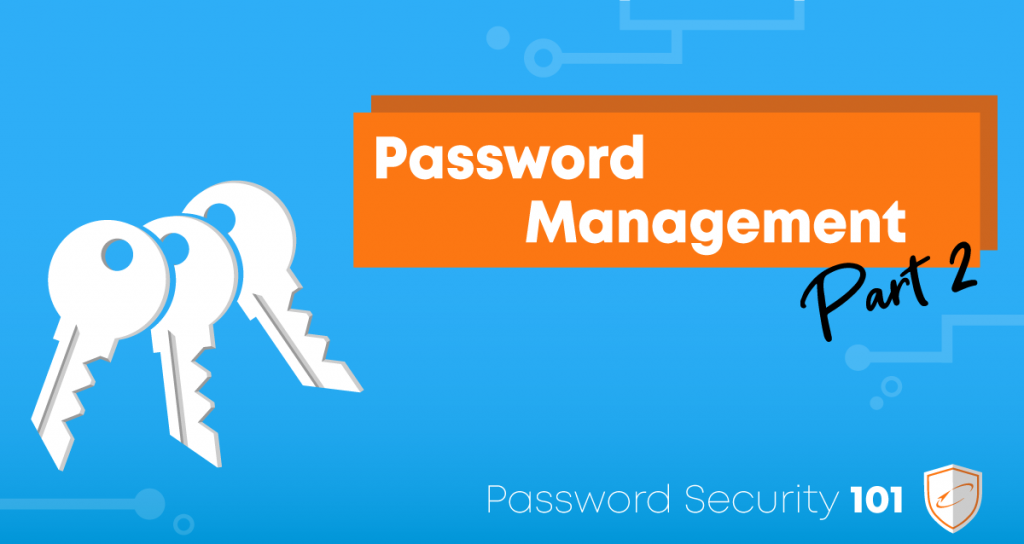Password Security: Part Two – Managing Multiple Passwords

In the first segment of our three-part password security series, we highlighted the importance of upgrading your passwords to reflect a new passphrase standard. If you missed that post, or need a quick refresher, you can review part one here.
Now that you understand the significant impact that passphrases can have on account security, it’s time to explore a second layer of account protection. This week, we’re focusing our attention on the importance of using multiple unique passphrases, while giving you some handy methods to keep track of all your new login credentials.
How Many Passwords is Too Many?
The answer to this question is simple. You can never have too many passwords. Think of your passwords the same as you would a set of keys. Each key on your key-ring is different, masterfully crafted to fit one specific lock. If these keys were all the same, losing one would put your home, car, office, and more at risk.
The same is true for passwords. When a hacker discovers an individual that uses the same password across multiple accounts, they liken it to hitting the lottery. From this one password, the hacker could potentially access your online banking, shopping, email, and even locally secured files. Now, as much as we’d all like to win the lottery at some point, absolutely no one wants to be the sole benefactor of the reward. Nevertheless, when using very few passwords across a plethora of accounts, you run the risk of losing quite a hefty sum of hard-earned money.
Think Smarter, Not Harder
So, if you’ve made it this far, you’re probably teetering on the idea of changing some of your login credentials, but you may not know where to start. Don’t fret, Rocket IT is here to help.
First and foremost, if you’ve read our blog on the importance of passphrases, you know that setting your password to reflect a current goal is a great place to start. That said, maybe your list of personal goals is short, and you don’t have enough to create a unique password for each of your online accounts. Whatever the reason may be, there is an alternative solution. By using an automated password generator, you can quickly and effectively create secure passwords.
Now, you may be asking yourself, how can I be sure this password generator isn’t secretly capturing my data, waiting to use it against me? Because this is a valid question, we have a few credible services we generally recommend to users, which are as follows:
Regardless of the service you choose, you’ll be given the opportunity to customize a series of security variables, resulting in a password that is unique to you.
Multiple Passwords? I Can Barely Keep Track of One!
Now, after generating all these new passwords, you may be left with some mixed emotions. On one hand, you feel secure, knowing you dramatically increased the security of your online presence. On the other hand, there’s a slight chance you’re feeling overwhelmed, not knowing how you’re possibly going to keep track of all these new passwords.
Once again, Rocket IT has the solution. Remember those password services you just used to create new and unique login credentials? These services also offer downloadable versions of their products. Once registering with one of these vendors, you’re given access to a wealth of new features. While some of these features are locked behind a small paywall, a lot of what you’ll need can be accessed free of charge.
For this segment of the password security series, we’re simple going to focus on the password management feature of these applications. By using a password manager, you’re able to store all your login credentials in one secure location, guarded by the cryptic master password that you create. Think of this manager application as a key-chain, holding all keys safely in one location. Taking this step makes it far more convenient to keep track of your online account information.
To further streamline the process, you can then customize the software’s settings, linking it across multiple devices, as well as giving it permission to auto-fill login credentials on designated sites. Choosing to register with a password management application alleviates the burden of keeping up with multiple unique passwords. If done correctly, you should simply be required to remember two passwords, the one associated with your computer login, and the other for the password manager itself.
Again, while there are numerous password managers available in today’s marketplace, Rocket IT recommends using either LastPass, Dashlane, or Roboform, depending on your specific needs. Furthermore, it’s important to note that your password management account for work credentials should be separate from the password management account associated with your personal information.
Interested in learning more about password security? Click here to read part 3 (two-fact authentication) of our password security blog series.
Where Do You Go From Here?
Having now taken these important password security measures, you’ve greatly mitigated the risk of having your information stolen. That said, there’s one final step you can take to immensely improve the security of your online accounts. In part three of this series, we’ll take a look at an advanced security feature that, when combined with our previous recommendations, is capable of thwarting even the most ruthless of hackers.
As always, to stay up-to-date on these releases, we encourage you to sign up for the Rocket IT newsletter, or follow us on Facebook, Twitter, and LinkedIn. In the meantime, if your organization is interested in implementing password security measures on a company-wide scale, feel free to give us a call at (770) 441-2520.
Together, we can help your business thrive.
Related Posts
Subscribe to Rocket IT's Newsletter
Stay up to date on trending technology news and important updates.

Find out if Rocket IT is the right partner for your team
Claim a free consultation with a technology expert.










